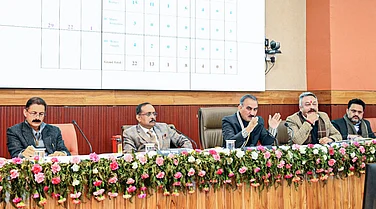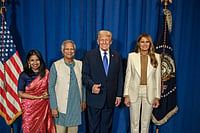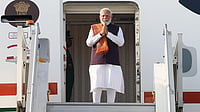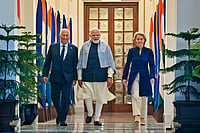The first meeting at the highest political level between leaders of India, the US, Japan, and Australia has finally formalised the quadrilateral into a coalition of democracies centred around the Indo-Pacific.
As Prime Minister Narendra Modi said in his opening remarks at the summit: "Today’s summit meeting shows that Quad has come of age. It will now remain an important pillar of stability in the region… we are united by our democratic values, and our commitment to a free, open, and inclusive Indo-Pacific…Our agenda today - covering areas like vaccines, climate change and emerging technologies - makes the Quad a force for global good.’’
Yet at its core the quad is the first attempt by four democratic countries to push-back against China’s rise, though this is being front-loaded by softer issues of vaccine manufacturing, supply chain networks, and emerging technologies in a post-Covid world. “We will work together, closer than ever before, for advancing our shared values and promoting a secure, stable, and prosperous Indo-Pacific,” the Prime Minister added.
The fact that the summit meeting is being held less than three months into Joe Biden presidency took office and that the move was initiated by the US, signals the importance Washington places on the quad as a means to collectively contain China’s unfettered rise in Asia. All countries, including India, were however at pains to point out that the quad is not aimed at any country and is a force for good. China was not mentioned in any public speech or in the joint statement issued after the summit.
Yet every member of the quad has had problems with China. India and China had a military confrontation in Ladakh last summer, and problems with an unresolved boundary dispute. Japan and China have a territorial dispute too, while Australia and China have plunged into a tit for tat tariff war. The US again has issues over China’s unfair trade practices and sees Beijing as a future challenger to American superpower status. So whether it is India’s Modi, US’s Biden, Japan’s Prime Minister Yoshihide Suga, or Australia’s Prime Minister Scott Morrison, all four leaders are on the same page on the threat from China. At heart, quad remains a security initiative though dressed up and expanded to embrace critical non-security issues.
The host, US President Joe Biden said in his opening statement: “— it’s also the first multilateral summit that I’ve had the opportunity to host as President. And on this — and on this moment, it’s a purpose that I think we all are concerned about: a free and open Indo-Pacific is essential to each of our futures, our countries. The United States is committed to working with you, our partners and all our allies in the region to achieve stability. And this is a group of — particularly important because it’s dedicated to the practical solutions and concrete results.’’
Briefing reporters after the summit, Foreign Secretary Harsh Shringla said that the quad has formed three working groups. One is on vaccine. The US and Japan will finance the manufacturing in India of American-made vaccines (possibly Novavax and Johnson & Johnson new vaccines) and ramp up production capacity in the country. The ambitious aim is to manufacture one billion vaccines by the end of 2022. “The idea is to leverage all our individual capabilities for our common good,’’ Shringla said. Australia will chip in to handle the last-mile distribution to Southeast Asian and Pacific and Indian island nations. Additionally, Australia will train health workers and help nations with storage capacity and last-mile delivery. The quad nations will coordinate with multilateral organizations, including WHO and COVAX. The leaders also called for transparency and reform in the WHO. This is over speculations that the WHO had been rather timid in dealing with China over the origin of the Covid-19 pandemic.
The Foreign Secretary said that Biden, Suga and Morrison individually praised India for supplying vaccines to 70 countries all over the world. The ramped-up capacity in India will also help in case of another pandemic that may occur in the future. Two more working groups, one on climate actions to mitigate, adapt, and adopt technology to fight climate change. This group will work towards implementing the provisions of the Paris Climate Agreement. The third working group is on critical and emerging technology to facilitate standards and innovative future technology. The emphasis here will also be on cooperation on telecommunications deployment, diversification of equipment suppliers, and developing future telecommunications through close cooperation with private sectors of the four countries. In short, the quad is preparing to ensure that an alternative supply chain not dependent on China is initiated.
The leaders also discussed regional issues. Though Shringla did not spell it out, the situation on the Ladakh border with China was also on the table. He merely hinted that all issues pertaining to the Indo-Pacific region were up for discussion. Myanmar too came up. All four partners said it was important to ensure that democracy was restored.
The joint statement released at the end of the summit said: “We have convened to reaffirm our commitment to quadrilateral cooperation between Australia, India, Japan, and the United States. We bring diverse perspectives and are united in a shared vision for the free and open Indo-Pacific. We strive for a region that is free, open, inclusive, healthy, anchored by democratic values, and unconstrained by coercion. Together, we commit to promoting a free, open rules-based order, rooted in international law to advance security and prosperity and counter threats to both in the Indo-Pacific and beyond. We support the rule of law, freedom of navigation and overflight, peaceful resolution of disputes, democratic values, and territorial integrity. We commit to work together and with a range of partners. We reaffirm our strong support for ASEAN’s unity and centrality as well as the ASEAN Outlook on the Indo-Pacific. Full of potential, the Quad looks forward to the future; it seeks to uphold peace and prosperity and strengthen democratic resilience, based on universal values.’’
China’s response to the quad was surprisingly mild. The Chinese foreign ministry spokesman Zhao Lijian merely said : “Exchanges and cooperation between nations should contribute to the mutual understanding and trust among nations, rather than targeting a third party or damaging the interests of a third country.” This was perhaps because a major meeting between US Secretary of State Antony Blinken and NSA Jake Sullivan with Chinese foreign minister Wang Yi is scheduled to be held on March 18 in Alaska.



























